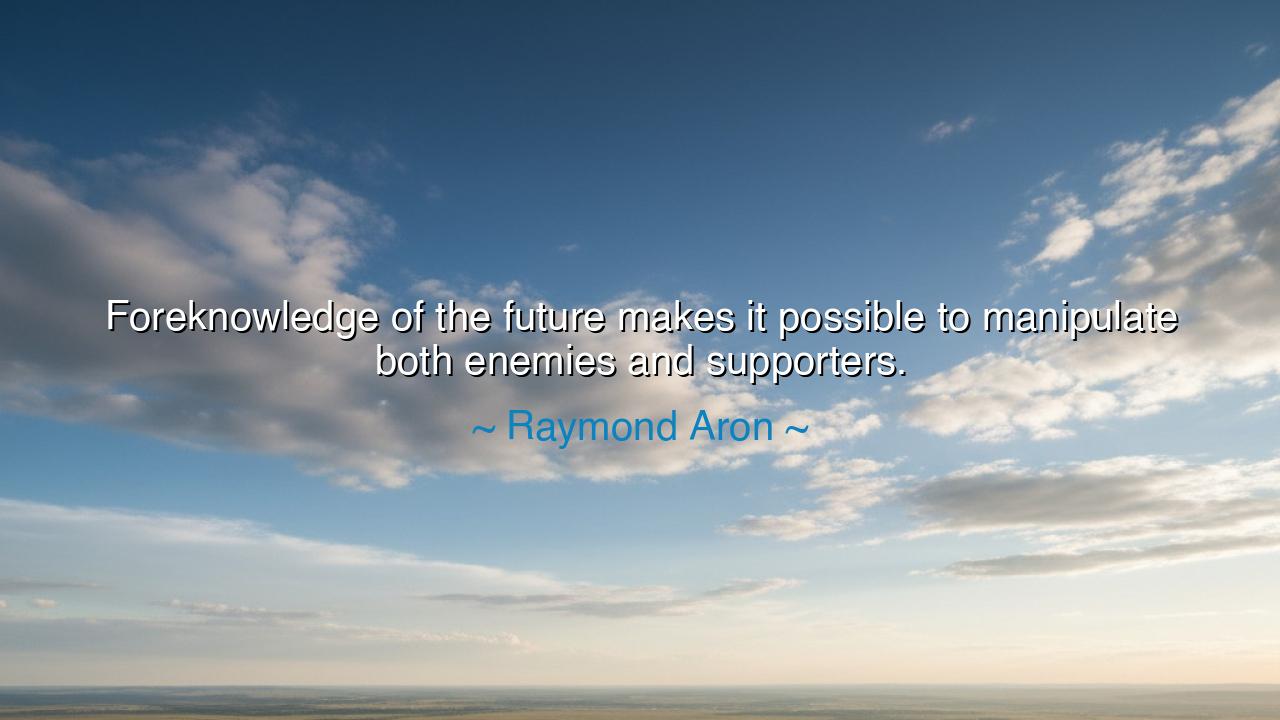
Foreknowledge of the future makes it possible to manipulate both
Foreknowledge of the future makes it possible to manipulate both enemies and supporters.






In the words of Raymond Aron, we are presented with a powerful truth about the nature of power, strategy, and the manipulation of those around us. He speaks of foreknowledge—the ability to predict and understand future events—and its profound impact on how we engage with both enemies and supporters. With the gift of foresight, one can control the flow of events, shaping outcomes by anticipating actions, reactions, and hidden desires. This ability to influence is not confined to the realm of battle alone but extends to the fabric of society, politics, and human interaction. By knowing what will come, one can lay traps for the unwary or encourage allies to act in ways that best serve their own desires. Aron’s insight speaks to the power embedded in the act of knowing what is to come—and using that knowledge to shape the future in one's favor.
This concept of foreknowledge as a tool for manipulation is not new. The ancients were acutely aware of the power that comes with understanding the future. Take, for instance, the great Sun Tzu and his Art of War. Sun Tzu emphasized that the key to victory lies in knowing both oneself and the enemy. “If you know the enemy and know yourself,” he wrote, “you need not fear the result of a hundred battles.” The wisdom here mirrors Aron’s sentiment: to understand the future movements of both opponents and allies is to wield immense power. In the same way, a leader who anticipates the actions of others can shape the course of war, politics, and relationships by positioning themselves strategically, pulling the strings of events before they unfold. Foreknowledge allows one to manipulate the forces of fate to serve their own ends.
Consider the story of Julius Caesar, one of history's most skilled practitioners of strategic foresight. In his conquest of Gaul, Caesar demonstrated a mastery of manipulating both allies and enemies. His ability to predict the moves of the Gallic tribes, while also understanding the ambitions of his Roman supporters, allowed him to play them against each other, creating divisions that worked to his advantage. By knowing the potential for betrayal and the desires of his allies, Caesar was able to manipulate events to secure his victory, and ultimately his rise to power. Like Aron’s description, Caesar’s foreknowledge of the future allowed him to manipulate both his supporters, through promises and calculated favors, and his enemies, through timely strikes and deceptive alliances.
This idea of control through knowledge extends beyond war and politics to the dynamics of everyday life. Think of the ancient courts of kings and emperors, where advisors and courtiers vied for favor by offering insight into future events—whether through the interpretation of omens, the study of the stars, or more practical intelligence. These individuals, who could predict what would happen next, held a special place of power. They were the unseen hands guiding the decisions of the monarch, and they, too, understood that the future could be manipulated by those who held the key to foresight. In this way, the past and present were shaped by the actions of those who influenced the future, often through deception or strategic alliances.
Aron’s quote also speaks to the moral complexity of wielding such knowledge. Foreknowledge of the future, in the wrong hands, can be a dangerous weapon—one that manipulates and controls for selfish gain. The ancient philosophers, like Plato, understood the peril of such power. In his Republic, Plato warned that those who seek to control the future, without wisdom or virtue, are likely to destroy the very society they wish to protect. This speaks to the dual nature of foreknowledge: it can be a force for good, guiding one toward the common good, or it can become a tool of tyranny, leading to manipulation and oppression. Like the gods of old who saw all but intervened only when necessary, those who hold the future in their hands must balance their power with wisdom and integrity.
The lesson to be drawn here is one of responsibility. Foreknowledge, whether in the context of personal relationships, politics, or leadership, carries great power, but it also carries immense moral weight. To predict the future and to act accordingly is to accept that one must bear the consequences of their actions, whether they are intended to help or harm. As leaders, we must be ever-conscious of how our knowledge of what is to come shapes not only our own paths but the lives of those we influence. Manipulation can be subtle, but it is never without consequences.
In our own lives, let us strive to gain wisdom and foresight, not for the purpose of manipulation, but for the betterment of those around us. Let us use our understanding of future events to guide others toward positive outcomes, making sure that our actions are aligned with the greater good. Whether in business, politics, or our personal relationships, the key is not to use knowledge to control, but to empower. Let us look toward the future with integrity, knowing that the choices we make today will shape the world of tomorrow. Foreknowledge is a tool, and like all tools, its value lies not in its ability to control but in how we choose to wield it.






AAdministratorAdministrator
Welcome, honored guests. Please leave a comment, we will respond soon